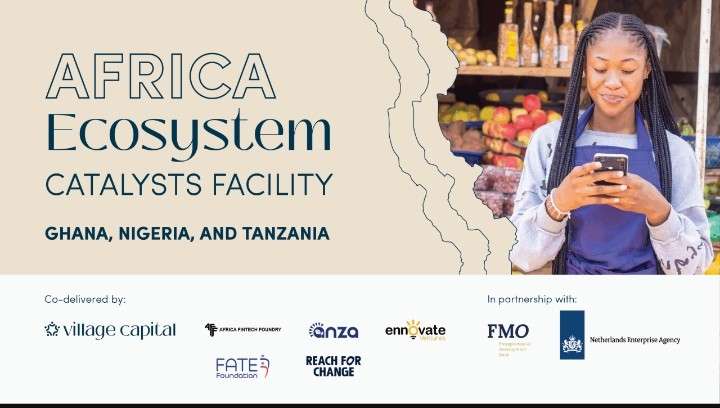In a major step to support African startups, Village Capital, a US-based investor focused on social impact, has teamed up with five African entrepreneur hubs to invest $4 million in early-stage businesses.
The initiative, supported by the Dutch Entrepreneurial Development Bank (FMO) and the Netherlands Enterprise Agency (RVO), will target startups in Ghana, Nigeria, and Tanzania that are working to improve local economies and fight climate-related challenges.
The selected hubs, known as Entrepreneur Support Organisations (ESOs), will work directly with Village Capital to identify and support startups with the most promising solutions.
Rather than relying on outside experts, the program puts local organisations at the heart of funding decisions, helping ensure the money goes to businesses that truly understand and serve their communities.
“No single investor can be an expert in every context, and that’s why this partnership matters,” said Nathaly Botero, Innovations Manager at Village Capital. “This model allows us to invest across markets while staying grounded in local realities.”
What/who is Village Capital
Founded in 2009, Village Capital is a US-based venture capital firm known for its “peer-selected investment” model and focus on supporting impact-driven startups in emerging markets.
With a footprint across Latin America, Africa, South Asia, and the United States, Village Capital has supported over 1,100 entrepreneurs and facilitated over $5 billion in follow-on funding through its programs.
Its core mission is to democratize entrepreneurship and reimagine the traditional investing model by prioritizing local context and inclusive access to capital.
Meet the Five Selected African ESOs
The five ESOs selected as venture partners are all locally established hubs with strong track records in startup development:
- Reach for Change (Ghana): A non-profit supporting social entrepreneurs solving problems facing children and youth, active in over 15 countries including Ghana.
- Africa Fintech Foundry (Nigeria): A technology accelerator backed by Access Bank, dedicated to scaling up fintech startups across the continent.
- Fate Foundation (Nigeria): One of Nigeria’s oldest non-profit enterprise support groups, offering training, funding, and mentorship to thousands of local entrepreneurs since 2000.
- Anza Entrepreneurs (Tanzania): A long-standing Tanzanian accelerator that helps small and growing businesses build sustainable models and access investment.
- Ennovate Ventures (Tanzania): A startup studio and innovation lab that supports tech startups through incubation, acceleration, and seed investment.
What the Program is All About
The Africa Ecosystem Catalysts Facility (AECF) is designed to bridge the early-stage funding gap by investing in context-specific innovations through a unique co-investment model.
Rather than applying a one-size-fits-all approach, the AECF prioritizes deep local knowledge by embedding ESOs directly into the investment process. This helps ensure that capital is not only accessible but also relevant and timely for local startups.
The facility is especially focused on businesses that address pressing issues such as access to finance, agriculture, clean energy, and climate adaptation.
Catalyst for Ecosystem Development
What sets the AECF apart is its ecosystem-embedded strategy: empowering local ESOs to shape investment decisions. This ensures that investment flows to startups with real potential and community relevance.
It also strengthens the broader entrepreneurship ecosystem by recognizing and reinforcing the role of grassroots organisations.
“For us, this isn’t just about sourcing deals,” added Botero. “It’s about making smarter, more informed investments by working alongside those already building and strengthening their entrepreneurial communities.”
By equipping ESOs as co-evaluators and funders, the initiative acts as a catalyst for a more resilient and self-sustaining entrepreneurial environment, one that is built on trust, local insight, and shared success.
Why this matters
Tech-focused support for African startups is critical not just for economic growth, but also for building resilient, locally relevant solutions to social, environmental, and financial challenges.
Across the continent, early-stage startups often face a severe funding gap, especially those working on climate resilience, agricultural innovation, digital finance, and youth employment. Initiatives like the Africa Ecosystem Catalysts Facility (AECF) play a vital role in closing this gap by aligning capital with community needs.
According to Dr. Bitange Ndemo, Kenya’s Ambassador to Belgium and former ICT Permanent Secretary,
“Africa’s digital transformation won’t be driven by external capital alone, it requires nurturing homegrown innovation ecosystems that truly understand local problems.”
He emphasizes that empowering local organisations to co-lead investments can significantly improve the relevance and impact of startup solutions.
Similarly, Farhan Nasirudeen, an Ilorin-based technology analyst,, notes that,
“Aiding tech growth and development in Africa is not a waste, it’s visionary. The continent is blessed with both unique problems and solutions, as well as leagues of homegrown geniuses to discover those problems and work out the solutions.”
By backing ESOs and locally-rooted ventures, tech support programs like AECF help unlock the continent’s untapped potential, accelerate job creation, and foster inclusive, sustainable development driven by Africans for Africans.
Talking Points
Village Capital’s Africa Ecosystem Catalysts Facility (AECF) is a commendable shift toward locally driven investment, empowering African Entrepreneur Support Organisations (ESOs) to co-lead funding decisions and tailor support to real community needs.
By anchoring capital deployment in local insight, the initiative strengthens startup ecosystems in Ghana, Nigeria, and Tanzania while addressing economic and climate challenges.
To deepen its impact, the program should include structured learning mechanisms and sector-specific technical support. Overall, AECF sets a promising example of how inclusive, locally informed funding can drive sustainable innovation across Africa.





